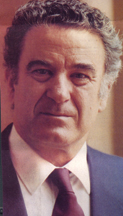French language prof hangs 'em up
French language prof hangs 'em up McGill University
User Tools (skip):
French language prof hangs 'em up
Opus took 20 years to complete

Giuseppe Di Stefano is expanding his award-winning dictionary.
Professor Giuseppe Di Stefano retired this year after 36 years at McGill's French Language and Literature department. He taught medieval literature, history and language, published widely and received many honours and awards, including France's Chevalier de l'Ordre des Arts et des Lettres.
Sicilian-born, Di Stefano worked in France at the Centre National de la Recherche Scientifique, Remaining affiliated with the University of Turin he edited their Study Francesi, or French Studies, journal. As he read more papers on Medieval French, it became apparent that the difficulty lay in understanding the idioms.
"An idiom is a way of speaking, an expression. No one had ever created a dictionary of expressions in medieval French before," says Di Stefano. "Editors didn't know where to turn to understand the expressions."
In 1991, after 20 years of researching more than 500 late-medieval French texts, his Dictionnaire des locutions en moyen français was published, winning him a Prix Chavée from the Académie des Inscriptions et Belles Lettres.
Rose Bidler studied under Di Stefano, graduating from the department in 1979. The same year, she and Di Stefano formed the publishing company Les Éditions Ceres, which continues to publish the internationally renowned journal Le moyen français, founded by Di Stefano in 1977, as well as topically related books.
"It was during my studies at McGill that my interest in middle French developed," recounts Bidler. "Di Stefano was quite popular and highly respected, even up to his last semester. Students found him understanding and patient."
Students like the former Quebec Minister of Education, Sylvain Simard, and media personality Robert Guy Scully, who at Di Stefano's 35-year teaching anniversary, said they knew very little about middle French when they entered McGill, but when they graduated they had gained a deep appreciation for it.
Though you'll find Di Stefano on Sundays in Little Italy watching soccer games, it's not all play and no work for the retiree. He's now tackling another dictionary — an expansion upon the previous one, which he predicts will be published next year. He's also planning a book on middle French word-play, and another on popular traditions, like superstitions, during the Middle Ages.
"I never get bored," admits Di Stefano. "There's always something to do."

